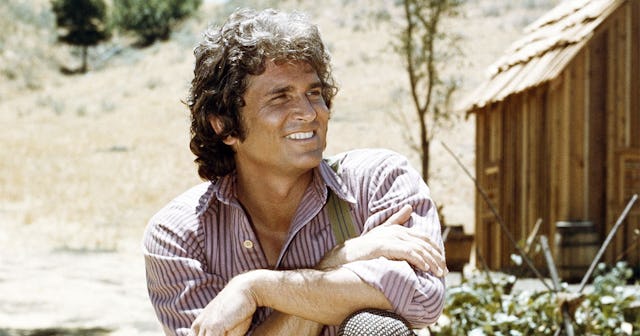I Consider Myself a Feminist, So Why Do I Find Charles Ingalls So Hot?

In early 2020, my older sister, Jennie, and I started a podcast. We’ve always talked about what it means to be Gen X and how belonging to that cohort, born mostly between 1964 and 1980, has shaped the way we see the world. We are cynical, suspicious, rebellious, and yet, oddly at peace with the traditional values and gender roles bestowed upon us as children. Lately, as we enter our forties and edge closer to middle age, we’ve begun to talk more about the impetus for this mindset. And then it became obvious. Gen X spent a lot of time in front of the television.
Thus, Gen X, This is Why was born. The concept is simple: we watch some shows and some famous movies from the ’70s and ’80s, we recap and then we ruminate on how the show may have crept into our subconscious. When considering which show would be our first, there was no question. It had to be our all-time favorite, Little House on the Prairie.
We are now 100 episodes into the podcast, and I have learned so much. I’ve been forced to re-examine my views on marriage, gender roles, community, fears, and so much more. I have learned, for example, our tendency towards catastrophizing may have been exacerbated by the constant tragedies the Ingalls family met whenever their patriarch, Charles, was out of town. This trope, I soon discovered, played out over and over again. Charles saving Caroline. Charles saving Laura. Charles saving everyone. I was shook when I realized just how much I had bought into this construct and the messages behind it.
I am a feminist, or at least I think I am. Maybe I was late to the table, but since I had twin daughters some fifteen years ago, I have begun noticing our place as women in a world created for and dominated by mostly men. Yet, every single time Michael Landon as Charles Ingalls flashes a smile and shakes his thick, curly mane, I am instantly transported to some version of a stereotypical 1950s housewife. I giggle, I feel flush, and I find myself cheering him on as Charles fights off some threat to his helpless family of women.
Moviestore/Shutterstock
Like most Gen Xers, I remember the character of Caroline, or “Ma,” as the epitome of motherhood. She loved and cared for Mary, Laura, Carrie, Grace, and eventually Albert. I remembered so vividly her tendency to run from the house and throw her arms around Charles each time he returned from a trip. Each time in her dress with every inch of her body covered. Most times with the addition of an apron. What I realized upon the rewatch is just how strong Ma really was. In the early seasons, she was the heart of the family, often finding herself on clean-up duty when one of the girls had trouble with boys or school. In The Award, the episode in which Mary studies so hard she almost burns down the barn, Caroline single-handedly saves their livestock and extinguishes the fire. She was a boss. But if you ask many Gen Xers, they’ll say she is most remembered for nearly losing her leg to an infection when Pa was out of town. Caroline is mostly remembered for what happens when Pa is not there. And it’s never good.
What did seven or eight-year-old Amye see when she watched this play out? What messages were received when night after night Charles was painted as the alpha male who would save all of us? Flash forward thirty-five years. It’s a Friday night in my small, country town, which means one thing: high school football. My girls attend a local game, after which I pick them up. One begins to cry the minute her small body collapses into the passenger seat. A boy had pushed her. Hard. She flew backwards and hurt her back. She struggles to catch her breath between sobs. In a blind rage, I demand to know where her boyfriend was when this happened. “He was there,” she mutters through sobs. Why didn’t he do anything? Why didn’t he punch him? Once I calmed down, I realized what I had said. My daughter’s boyfriend, who was at least a foot smaller than this bully, did the absolute right thing and alerted some parents nearby instead of adding to the violence of the moment. But I was shocked by my response. My instinct was to look for a man to protect my daughter, when it should have been for my daughter to protect herself.
I have a long way to go. The de-programming is real, and it’s something I’m working on a little bit each day. The first step is recognizing there’s a problem. And there is. I have found myself attracted to toxic masculinity most of my life, and while there are many reasons for this that go beyond a simple television show, shows like Little House reinforced these ideas for a whole generation of young people.
Now when I watch an episode, not only am I fighting within myself to resist that handsome Michael Landon grin, but I am actively looking for those subtle messages. Go to church. Obey your parents. Abstain from alcohol. Don’t buy what you can’t afford. Don’t spoil your children. Some of this is derived from the source material, the best-selling novels by Laura Ingalls Wilder, but much of it was a product of our time inserted into the show by Executive Producer Landon and others. It was a conservative response to the counterculture movement of the ’60s. And this is where my dilemma lies. Can I be a feminist, yet still fall for the hypermasculine portrayal of Charles Ingalls every single time? I guess I’ll keep watching and find out.